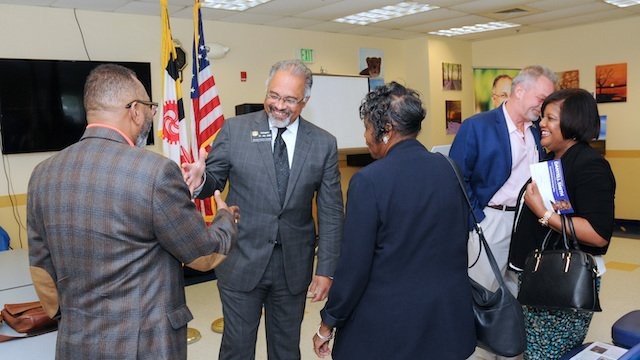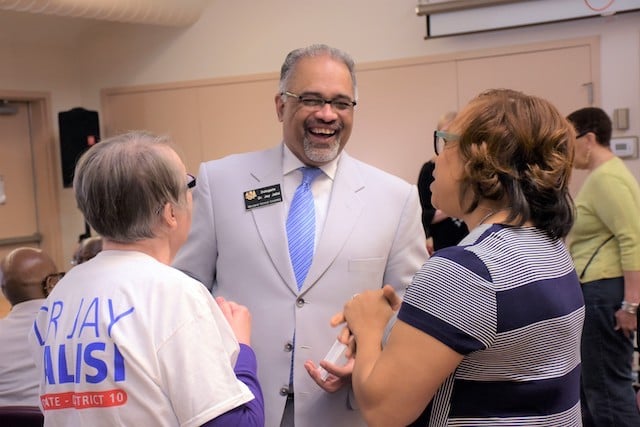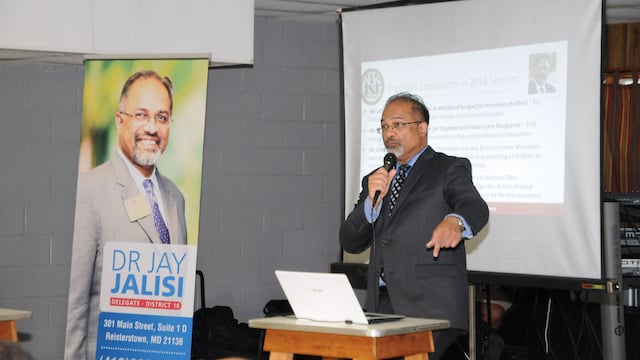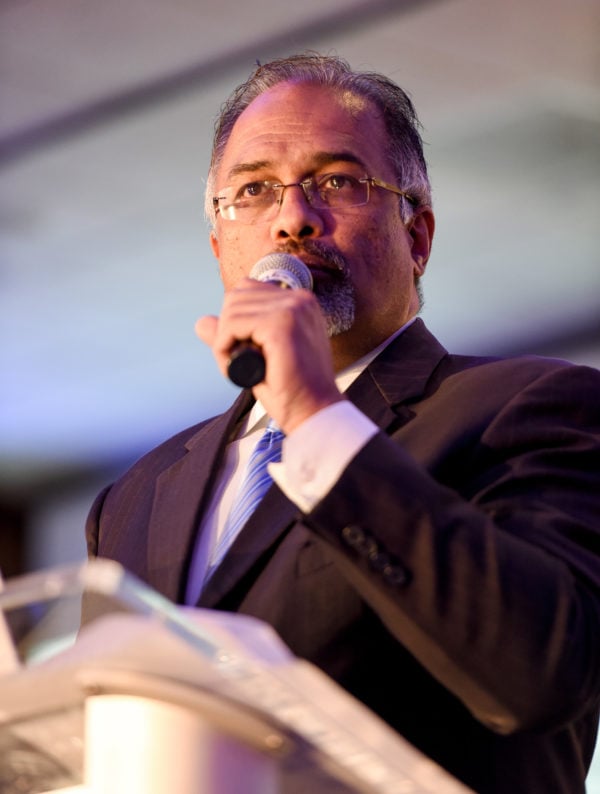In conversation with a Pakistani aspirant to US Congress
Dr Hasan ‘Jay’ Jalisi wants to make a dent on immigration policy

At 10:30am, amid the clanking of kitchenware and coffee pots, the Hyderabad-born Jalisi apologises to The Express Tribune because the first meeting is running long. A few minutes later, the candidate for US Congress ends a productive discussion with his constituent with a handshake and turns to the side for the interview.
Jalisi, 54, is hoping to become the first person of Pakistani origin to be elected to the US House of Representatives. In his heavily Democratic constituency, the biggest challenge is not going to be the special election on April 28, but the party primary on February 4. The election comes because of the death of Representative Elijah Cummings late last year.

When asked about Cummings, a towering figure in US and Maryland politics, Jalisi said he was "devastated" by his passing. "Elijah...was my friend for a long time and also my mentor. He brought me into elected politics. He supported me every election I did. He did robocalls for me. He headlined my fundraisers. He did mailers with me. Everything I asked him, he would do. And so that develops a bond of trust, and I treated him like an elder brother, and he always responded in the same way."
Jalisi also noted that Cummings was a "private person", who despite regular meetings, "never complained about his health".
Jalisi said it was an honour to have learned from"such a great guy", and promised to continue working on the issues Cummings cared about most — civil rights, equal rights for all, ending opioid addiction in Maryland, and reducing crime.
Jalisi is polling well ahead of the primary in February and could well end up with the nomination, based in no small part on his closeness with the seat's former occupant. But how did this former student of Karachi's BVS Parsi High School, DJ Science College, and Dow Medical College end up in the US?
"In 1992...I got an appointment at Harvard to work at the Joint Center for Otolaryngology, and so I came to the US. After I finished my training at Harvard, I got a fellowship at the Cleveland Clinic, so I moved to Cleveland, and then in 1997, I came to Baltimore to work at Johns Hopkins University."
The father of two said he was active in the community but really became active in state politics after becoming a citizen in 2009. "I ran for office in 2010. It was a Democratic central committee race, I lost it, and then I ran again in two years, and then I won," he said with a smile.
In 2014, a campaign based on "issues related to the people I was going to represent," including neighbourhood security, reducing crime, increasing jobs, improving education, and helping small businesses saw District 10 voters sending Jalisi to the state capital, Annapolis.
Jalisi spoke extensively on crime, which has brought notoriety to the Baltimore area. "Crime is on the increase, and that's one of the main issues I'll be working on. I think crime is also related to education and the availability of jobs. Crime cannot just be solved by increasing policing. That creates civil rights violations, it creates the mentality of a police state." His solution was to "improve education and improve job opportunities, especially for younger adults," which he felt would "automatically help with the reduction of crime."
"Of course, there will be career criminals who will not change, and so for that, we need better vigilance, better intelligence, and we need to have better policing," he added.
But he was also opposed to aggressive policing measures such as 'stop-and-frisk' to detain and search people.

When Mayor [Michael] Bloomberg was the mayor of New York, his policy was stop and frisk. The police could stop anyone and frisk them for contraband. I think that creates a lot of fear in immigrant communities and people of colour and I would not support that."
He also expanded on the fear immigrants face and how it keeps them out of everyday life.
"The first issue immigrants have is an issue of fear. They are being made to feel these days like they are an unwanted child, and that should change," he said, while criticising the daily multicoloured terror alerts that were common under President Bush's administration. "It created fear every morning amongst people who were immigrants, and also people of colour and especially Muslims."
On immigration reform, Jalisi said, "We need to give immigration status or green cards on merit. The US government gives out hundreds of thousands of H-1B visas (work visas), but to convert them into a green card takes decades. I think that's not fair."
He felt that the quota on how many H-1B visa recipients can apply for a green card should be left to the company or the people who are sponsoring a person "because that will be on merit."
He was also critical of the seven per cent government quota for India, Pakistan and some other countries because "it just creates a huge backlog and also creates a feeling of not being wanted. If 100,000 people are coming from Pakistan on H1-B visa, but only 7,000 can get green cards in a given year, then it creates a backlog every year of 93,000 people."
Jalisi also gave a very human example of the impact of this backlog. "Even for spouses, it takes about two years for your spouse to get a green card, and that is preposterous because a lot of marriages fail because the husband is living in the US and the wife is living in Pakistan or India, or vice versa. It's very difficult to travel back and forth, and of course, when you get married, you want your spouse to be with you and not 10,000 miles away."
He was also pragmatic in his support of a path to citizenship for undocumented immigrants. "I believe that every immigrant and even undocumented immigrant should have a clear path to citizenship because that creates a broader tax base, and it creates more loyalty for the country."
On the immigrant experience, he said, "A common problem among immigrant communities, whether they are Pakistani or Latinos, or African immigrants, is that they do not vote." He explained that voting creates awareness and makes immigrants feel that they have a stake in the country. "That's why I noted earlier that unless you have a clear path for citizenship, for immigrants, even undocumented immigrants, they would not feel any different."
For Pakistani immigrants, he said that because "Pakistan has been under authoritarian or military dictatorships for so long, just the concept of regular elections, as you know, is unique. This is the first time in its history that Pakistan has had three consecutive elections ever."
Jalisi said he was elected in 2018 for the Maryland Assembly elections with one of the highest vote totals in the whole state, and he did it by reaching out to African-American and white voters. "This time, because the congressional district is bigger and there are substantially more Pakistani Americans in the district, I have made special efforts to reach out to them."
He noted that less than one per cent of the Pakistani population in his constituency had voted in each of the last four elections.
"They can go to the polls, they can vote by absentee ballot, and there are so many other ways to vote even if you can't make it to the polling station on the day of the election."
Asked about Donald Trump’s impeachment, Jalisi saw the chances of the US president being ousted as slim. “We will see how the case is laid out. Obviously, the House of Representatives was the prosecutor. But the Judge and the jury is the senate. So when they bring the case to the senate, then we’ll see how it goes,” he said.
“If I were I betting man I would think that Trump would not be impeached, just because of the sheer fact that his party is in majority in the senate, and I just don't see four senators defecting from the republican side who are elected republicans and switching their loyalties to vote for impeachment,” he added.

As for how, the impeachment drama would impact Trump’s reelection chances, Jalisi felt it would all come down to the final outcome. “Anytime someone is accused of a crime and they are not found guilty by a court of jurisdiction, it always helps the accused. I think that Trump will be able to take this back to his constituents and say that he was targeted unfairly,” he explained. “How effective that is going to be, I don't know.”
When asked what he loved most about America, he said freedom to travel. "The USA, as you know, is a union of 50 independent countries. If they were separate, they would be independent countries and very powerful and successful ones, but here, you don't need a passport to travel from one place to the other. So that's freedom of movement."
He also noted the importance of freedom of speech, even though he has been on the receiving end of some hateful speech. "Being a Muslim, you get targeted. I have been targeted many times, and [being] immigrant adds another layer of racism and bigotry, but that is everywhere. I can see no country where you don't face this so in the US at least we have freedom of speech, freedom to travel, and freedom to practice religion."
He added that the US "is a very free country. You can be as conservative as you want and watch movies and eat the food you like, or you can be very liberal and progressive and live your life the way you want."
Asked what he misses about Pakistan, he quickly said, "Pani puri! I can't find good pani puri here. You can get it in the stores, but the pani and the puri are not that great." He added, "You miss the places you have lived and the friends that you left behind, and of course the memories."
He closed with a message to Pakistan's youth. "I am very impressed by them, their effectiveness on social media to create change in Pakistan. I think that they should continue working hard with their studies and education is the only asset that you can acquire that will carry you through life. So get the best education possible and then head on over to the US to get even better education!"



















COMMENTS
Comments are moderated and generally will be posted if they are on-topic and not abusive.
For more information, please see our Comments FAQ